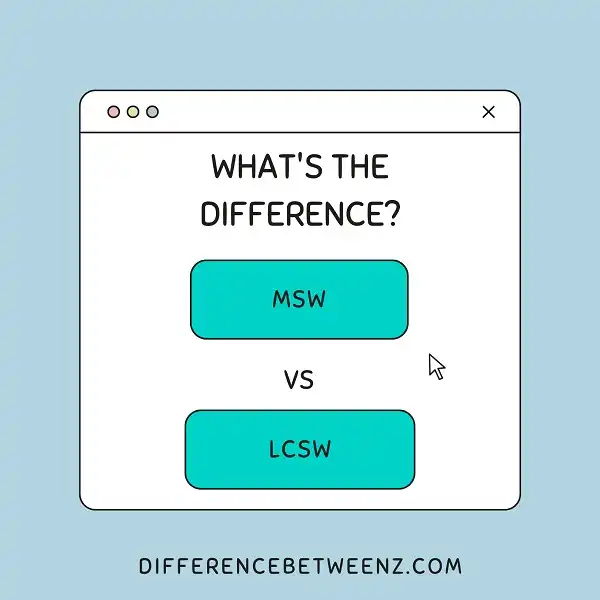Licensed Clinical Social Workers (LCSWs) and Master’s level Social Workers (MSWs) differ in their level of training and focus. LCSWs are required to have a minimum of two years of post-graduate clinical experience, while MSWs may only have one year of clinical experience. LCSWs must also complete additional coursework in diagnosis, assessment, and treatment planning, while MSWs are not required to do so.
What is MSW?
MSW Master’s Degree in Social Work is a professional degree that trains students for clinical social work practice with individuals, families, and groups. MSW programs prepare students for the advanced generalist or clinical social work practice.
- MSW programs typically include coursework in social work values and ethics, human behavior and the social environment, social welfare policy and services, research, and field education.
- MSW programs also include specialized courses in one or more practice areas such as child welfare, mental health, medical social work, gerontological social work, or substance abuse. MSW programs culminate in a master’s thesis or practicum.
- Admission to MSW programs usually requires a bachelor’s degree in social work (BSW) from a Council on Social Work Education (CSWE) accredited program. MSW degrees are offered by universities both nationwide and internationally.
MSW graduates are prepared to take the clinical social work licensing exam to become licensed clinical social workers (LCSWs). MSW programs typically take two years of full-time study to complete. Some MSW programs offer an accelerated format that can be completed in one year of full-time study or less. Part-time study options are also available at some schools.
What is LCSW?
LCSW is short for Licensed Clinical Social Worker. LCSWs are mental health professionals who provide individual, couples, and family therapy. LCSWs work in a variety of settings, including outpatient mental health clinics, hospitals, and private practice. LCSWs are trained in a variety of therapies, including cognitive-behavioral therapy, psychodynamic therapy, and solution-focused therapy.
In order to become an LCSW, one must complete a Master’s degree in social work and pass a state-administered licensing exam. LCSWs must also complete continuing education credits on a regular basis in order to maintain their license. LCSWs are an important part of the mental health care team and play a vital role in helping people to manage their mental health concerns.
Differences between MSW and LCSW
MSW and LCSW are both professionals who work with people to improve their lives. MSW focuses on social work, which is a branch of work that helps people with issues in their everyday lives. LCSW focuses on clinical social work, which is a branch of work that helps people who have mental health issues.
- Both MSW and LCSW can help people with different types of issues, but MSW is more focused on helping people with everyday life problems and LCSW is more focused on helping people with mental health issues.
- MSW and LCSW both have different education requirements. MSW requires a bachelor’s degree in social work while LCSW requires a master’s degree in clinical social work. MSW and LCSW also have different licensure requirements.
- MSW requires a license from the Social Work Board while LCSW requires a license from the Clinical Social Work Board. MSW and LCSW can both be very rewarding careers, but they are different in many ways.
Conclusion
The Licensed Clinical Social Worker (LCSW) credential requires more training and experience than the Master of Social Work (MSW). LCSWs are able to provide therapy to individuals, families, and groups. MSWs are not able to provide therapy and cannot call themselves clinical social workers. If you are interested in providing therapy as a social worker, you will need to become an LCSW.


